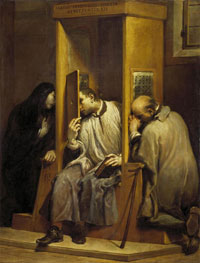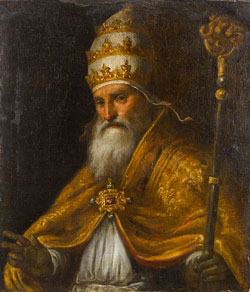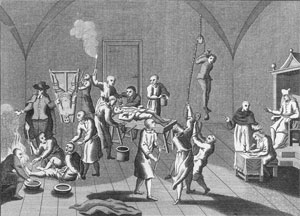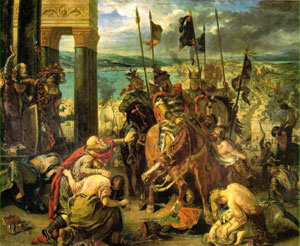To review, here are the remaining six criteria for identifying the little horn with the Papacy:
- It has eyes like the eyes of a man and a mouth speaking great words against the Most High (Daniel 7:20,25)
- It makes war against the saints (Daniel 7:21)
- It presumes it can change times and change laws (Daniel 7:25)
- Its war against the saints, times and laws will continue for a time, times and the dividing of time (Daniel 7:25)
- It devours the whole earth (Daniel 7:23)
- It reigns until the Ancient of Days comes (Daniel 7:22)
Daniel described the little horn having eyes like a man and a mouth speaking great words against the Most High. The prophet also described seeing a likeness of man in the lion which portrayed Babylon. This man symbolism is expanded upon by the prophet Ezekiel, as I have already shown on The Four Great Beasts page. The contact points this prophecy has with New Testament texts clearly tell us these great words will be blasphemies against the Most High. Blasphemy is defined in the gospels when the Jews accused Yashuah:
And behold, some people brought to him a paralytic, lying on a bed. And when Jesus saw their faith, he said to the paralytic, “Take heart, my son; your sins are forgiven.” And behold, some of the scribes said to themselves, “This man is blaspheming.” [Matthew 9:2,3]
And when Jesus saw their faith, he said to the paralytic, “Son, your sins are forgiven.” Now some of the scribes were sitting there, questioning in their hearts, “Why does this man speak like that? He is blaspheming! Who can forgive sins but God alone?” [Mark 2:5-7]
[Jesus said,] “I and the Father are one.” The Jews picked up stones again to stone him. Jesus answered them, “I have shown you many good works from the Father; for which of them are you going to stone me?” The Jews answered him, “It is not for a good work that we are going to stone you but for blasphemy, because you, being a man, make yourself God.” [John 10:30-33]
The man who speaks blasphemy claims to be God, or to have God’s authority to pardon sin. There are many false prophets and false doctrines in the world today that proclaim anything and everything as “God”, but there is only one standing and seemingly-everlasting authority figure in this world that presumes the power to pardon sin: the Papacy.
We hold upon this earth the place of God Almighty [Apostolic Letter of Pope Leo XIII June 20, 1894]
With regard to the mystic body of Christ, that is, all the faithful, the priest has the power of the keys, or the power of delivering sinners from hell, of making them worthy of paradise, and of changing them from the slaves of Satan into the children of God. And God himself is obliged to abide by the judgment of his priests, and either not to pardon or to pardon, according as they refuse or give absolution, provided the penitent is capable of it. “Such is,” says St. Maximus of Turin, “this judiciary power ascribed to Peter that its decision carries with it the decision of God.” The sentence of the priest precedes, and God subscribes to it. [Dignity and Duties of the Priest, 1889]
This judicial authority will even include the power to pardon sin. [Catholic Encyclopedia Volume 12]

Q: What is the Sacrament of Penance?
A: It is a Sacrament in which the Priest, in the place of God, forgives sins; when the sinner is heartily sorry for them, sincerely confesses them, and is willing to perform the penance imposed upon him.
Q: Does the Priest truly forgive the sins, or does he only declare that they are remitted?
A: The Priest does really and truly forgive the sins in virtue of the power given to him by Christ. [Joseph DeHarbe’s Catechism of the Catholic Religion, 1912]
Seek where you will, throughout heaven and earth, and you will find but one created being who can forgive the sinner, who can free him from the chains of sin and hell; and that extraordinary being is the priest, the Catholic priest. “Who can forgive sins except God?” was the question which the Pharisees sneeringly asked. “Who can forgive sins?” is the question which the Pharisees of the present day also ask; and I answer, there is a man on earth that can forgive sins, and that man is the Catholic priest. [Michael Müller, The Catholic Priest]
Therefore, of the one and only Church there is one body and one head, not two heads like a monster; that is, Christ and the Vicar of Christ, Peter and the successor of Peter, …Therefore whoever resists this power thus ordained by God, resists the ordinance of God [Rom 13:2], unless he invent like Manicheus two beginnings, which is false and judged by us heretical, since according to the testimony of Moses, it is not in the beginnings but in the beginning that God created heaven and earth [Gen 1:1]. Furthermore, we declare, we proclaim, we define that it is absolutely necessary for salvation that every human creature be subject to the Roman Pontiff. [Pope Boniface VIII, Unam Sanctam, 1302]

He that reigneth on high, to whom is given all power in heaven and earth, has committed one holy Catholic and apostolic Church, outside of which there is no salvation, to one alone upon earth, namely to Peter, the first of the apostles, and to Peter’s successor, the pope of Rome, to be by him governed in fullness of power. Him alone He has made ruler over all peoples and kingdoms, to pull up, destroy, scatter, disperse, plant and build, so that he may preserve His faithful people (knit together with the girdle of charity) in the unity of the Spirit and present them safe and spotless to their Saviour. [Pope Pius V, Regnans in Excelsis, Excommunicating Elizabeth I of England, 1570]
Who is the priest? A man who holds the place of God, a man who is clothed with all the powers of God. “Go,” said Our Lord to the priest, “as My Father has sent Me, I send you.” At the Consecration, the priest does not say: “This is the Body of Our Lord.” He says: “This is My Body.” See then the power of the priest! The tongue of the priest and a morsel of bread makes a God. It is more than the creation of the world. Someone said: “St. Philomena obeys the Curé d’Ars.” Indeed she may well obey him since God Himself obeys him. The Blessed Virgin cannot make her divine Son come down into the Host. A priest, no matter how simple he is, can do this. Oh! how wonderful the priest is! The priest will only understand himself really in heaven. If he understood it on earth he would die, not of fear, but of love. If I met a priest and an angel, I would salute the priest before saluting the angel. The angel is the friend of God, but the priest holds his place. St. Teresa used to kiss the place where a priest had passed. One values greatly objects which have been placed in the bowl of the Blessed Virgin and the Infant Jesus in Loreto, but the fingers of the priest which have touched the adorable Flesh of Jesus Christ, which are plunged in the chalice where His precious Blood has been, in the ciborium where His Body has been, are they not more precious? [The Eucharistic Meditations of the Curé D’Ars]
The Word became flesh to make us “partakers of the divine nature”: For this is why the Word became man, and the Son of God became the Son of man: so that man, by entering into communion with the Word and thus receiving divine sonship, might become a son of God. For the Son of God became man so that we might become God. The only-begotten Son of God, wanting to make us sharers in his divinity, assumed our nature, so that he, made man, might make men gods. [Catechism of the Catholic Church, Part One, Section Two, Chapter Two, Article 3]
Will Roman Catholics deny, that the Pope styles himself “God on earth?” Let them go to Rome, they will read on the gate of the city: “Paulas III. Pontifex Opt. Maxim, in terris Deus.” [Paul III. High priest, the best, the greatest, and God on earth.] Without going to Rome we find papal arrogance in every decree, which comes from the Vatican. The reader will kindly examine the conclusion of the ordination letter, which I have prefixed at the beginning of this volume, and he will find as follows. Page 7, line 11.
“Given in Rome from our Palace, the first of February 1817, the XIV. jurisdiction of the most holy Pontiff and Father in Christ, and Lord our God, the Pope Leo XII. through the Divine Providence, the IV year of his reign,”
Pope Martin V. wrote in the despatches with which he furnished his ambassador to Constantinople: “Sanctissimus, et Beatissirnus, qui habet coeleste arbitrium, qui est Dominus in terris, successor Petri, Christus Domini, Dominus Universi, Regum Pater, orbis Lumen.” In plain English it reads simply thus: “The most Holy and most happy, who is the arbiter of heaven, and the Lord of the earth, the successor of St. Peter, the anointed of the Lord, the Master of the universe, the father of kings, the light of the world,”
What will the Emperor of China say, who pretends to be the Lord of the Sun, when the British officers tell him that the pope is the arbiter of heaven, and the master of the universe? What must the grand Sultan think, who declares himself emperor of the moon and stars, when he hears that the pope is not only the arbiter of heaven, but also the light of the world? How must it tickle the emperor of Russia, and the fair queen of England, when they are told that the Pope calls himself, “the father of kings?” Is it not painful to hear in the light of the nineteenth century, such absurd doctrines as these, and even more painful to see people with minds so totally shrouded in ignorance, as to be capable of believing such abominable dogmas?
To call a man, “God on earth, Vicar of Christ, most Holy Father, Arbiter of heaven, and Lord of the Universe,” is this not virtually making him equal with God Almighty? Is it not giving God a competitor? To call the Pope “the anointed of the Lord, the father of kings, and the light of the world,” is it not blasphemous? Can such titles be applied to any other, except to Christ himself, without the profanation of the word of God, or without committing sacrilege against his most holy Son? Such is the foundation upon which the infallible authority of the self-styled universal bishop of Rome is based. I ask, is it not founded upon the sand, of which our Saviour speaks in his gospel? I repeat it, to call the Pope, “God on earth,” is blasphemy so monstrous, that even Satan himself, cunning as he is, could not invent a greater profanation of the name of God, or assume greater pretentions, or manifest a more infernal spirit, or teach a more obnoxious and criminal doctrine than this. [Papal Rome As It Is]
It makes war against the saints
As I looked, this horn made war with the saints and prevailed over them, until the Ancient of Days came, and judgment was given for the saints of the Most High, and the time came when the saints possessed the kingdom. [Daniel 7:21,22]
That the Church of Rome has shed more innocent blood than any other institution that has ever existed among mankind, will be questioned by no Protestant who has a competent knowledge of history. The memorials, indeed, of many of her persecutions are now so scanty, that it is impossible to form a complete conception of the multitude of her victims, and it is quite certain that no powers of imagination can adequately realise their sufferings.

Llorente, who had free access to the archives of the Spanish Inquisition, assures us that by that tribunal alone more than 31,000 persons were burnt, and more than 290,000 condemned to punishments less severe than death. The number of those who were put to death for their religion in the Netherlands alone, in the reign of Charles V., has been estimated by a very high authority at 50,000, and at least half as many perished under his son. And when to these memorable instances we add the innumerable less conspicuous executions that took place, from the victims of Charlemagne to the free-thinkers of the seventeenth century; when we recollect that after the mission of Dominic the area of the persecution comprised nearly the whole of Christendom, and that its triumph was in many districts so complete as to destroy every memorial of the contest; the most callous nature must recoil with horror from the spectacle. For these atrocities were not perpetrated in the brief paroxysms of a reign of terror, or by the hands of obscure sectaries, but were inflicted by a triumphant Church, with every circumstance of solemnity and deliberation. Nor did the victims perish by a brief and painless death, but by one which was carefully selected as among the most poignant that man can suffer. They were usually burnt alive. They were burnt alive not unfrequently by a slow fire. They were burnt alive after their constancy had been tried by the most excruciating agonies that minds fertile in torture could devise. This was the physical torment inflicted on those who dared to exercise their reason in the pursuit of truth; but what language can describe, and what imagination can conceive, the mental suffering that accompanied it? For in those days the family was divided against itself. The ray of conviction often fell upon a single member, leaving all others untouched. The victims who died for heresy were not, like those who died for witchcraft, solitary and doting women, but were usually men in the midst of active life, and often in the first flush of youthful enthusiasm, and those who loved them best were firmly convinced that their agonies upon earth were but the prelude of eternal agonies hereafter. This was especially the case with weak women, who feel most acutely the sufferings of others, and around whose minds the clergy had most successfully wound their toils. It is horrible, it is appalling to reflect what the mother, the wife, the sister, the daughter of the heretic must have suffered from this teaching. She saw the body of him who was dearer to her than life, dislocated and writhing and quivering with pain; she watched the slow fire creeping from limb to limb till it had swathed him in a sheet of agony; and when at last the scream of anguish had died away, and the tortured body was at rest, she was told that all this was acceptable to the God she served, and was but a faint image of the sufferings He would inflict through eternity upon the dead. Nothing was wanting to give emphasis to the doctrine. It rang from every pulpit. It was painted over every altar. The Spanish heretic was led to the flames in a dress covered with representations of devils and of frightful tortures, to remind the spectators to the very last of the doom that awaited him.
All this is very horrible, but it is only a small part of the misery which the persecuting spirit of Rome has produced. For, judging by the ordinary measure of human courage, for every man who dared to avow his principles at the stake, there must have been multitudes who believed that by such an avowal alone they could save their souls, but who were nevertheless scared either by the prospect of their own sufferings or of the destitution of their children, who passed their lives in one long series of hypocritical observances and studied falsehoods, and at last, with minds degraded by habitual deception, sank hopeless and terror-stricken into the grave. And besides all these things, we have to remember that the spirit which was manifested in acts of detailed persecution had often swept over a far wider sphere, and produced sufferings not perhaps so excruciating, but far more extensive.

We have to recollect those frightful massacres, perhaps the most fearful the world has ever seen: the massacre of the Albigenses which a pope had instigated, or the massacre of St. Bartholomew for which a pope returned solemn thanks to Heaven. We have to recollect those religious wars which reproduced themselves century after century with scarcely diminished fury, which turned Syria into an Aceldama, which inundated with blood the fairest lands of Europe, which blasted the prosperity and paralysed the intellect of many a noble nation, and which planted animosities in Europe that two hundred years have been unable altogether to destroy. [Lecky, History of the Rise and Influence of the Spirit of Rationalism in Europe Vol. 2, 1865]
The interesting question has been warmly discussed, whether the Inquisition of Spain was a papal institution or an institution of the state, and the attempt has been made to lift the responsibility for its organization and administration from the supreme pontiff. The answer is, that it was predominantly an ecclesiastical institution, created by the authority of Sixtus IV. and continuously supported by pontifical sanction. On the other hand, its establishment was sought after by Ferdinand and Isabella, and its operations, after the papal authorization had been secured, was under the control of the Spanish sovereign. So far as we know, the popes never uttered a word in protest against the inhuman measures which were practiced by the Spanish tribunals. Their only dissent arose from the persistence with which Ferdinand kept the administrative agency in his own hands and refused to allow any interference with his disposition of the sequestered estates. [Philip Chaff, The Christian Church from the 1st to the 20th Century]
It presumes it can change times and change laws
The Roman Pontiff is the only power on Earth this can properly apply to. Every country that trades internationally must use Pope Gregory’s calendar. When the Gregorian calendar was established, it imposed a change in reckoning of months, years and leap years. It may also be worth mentioning the calendar was revised from existing systems introduced by Julius Caesar and Dionysius Exiguus, who were of course, Roman.
The fact that the Papacy presumes it can change Yahuah’s laws is demonstrated in their ten commandments.
Ten Commandments |
Rome's Ten Commandments |
| I am the Lord your God, who brought you out of the land of Egypt, out of the house of slavery. You shall have no other gods before me | I am the Lord your God; you shall not have strange gods before me |
| You shall not make for yourself any graven image, or any likeness of anything that is in heaven above, or that is in the earth beneath, or that is in the water under the earth. You shall not bow down to them or serve them, for I the Lord your God am a jealous God, visiting the iniquity of the fathers on the children to the third and the fourth generation of those who hate me, but showing steadfast love to thousands of those who love me and keep my commandments | |
| You shall not take the name of the Lord your God in vain, for the Lord will not hold him guiltless who takes his name in vain | You shall not take the name of the Lord your God in vain |
| Remember the Sabbath day, to keep it holy. Six days you shall labor, and do all your work, but the seventh day is a Sabbath to the Lord your God. On it you shall not do any work, you, or your son, or your daughter, your male servant, or your female servant, or your livestock, or the sojourner who is within your gates. For in six days the Lord made heaven and earth, the sea, and all that is in them, and rested on the seventh day. Therefore the Lord blessed the Sabbath day and made it holy | Remember to keep holy the Lord's day |
| Honor your father and your mother, that your days may be long in the land that the Lord your God is giving you | Honor your father and your mother |
| You shall not kill | You shall not kill |
| You shall not commit adultery | You shall not commit adultery |
| You shall not steal | You shall not steal |
| You shall not bear false witness against your neighbor | You shall not bear false witness against your neighbor |
| You shall not covet your neighbor's house; you shall not covet your neighbor's wife, or his male servant, or his female servant, or his ox, or his donkey, or anything that is your neighbor's | You shall not covet your neighbor's wife |
| You shall not covet your neighbor's goods |
Sorry this page is still unfinished…